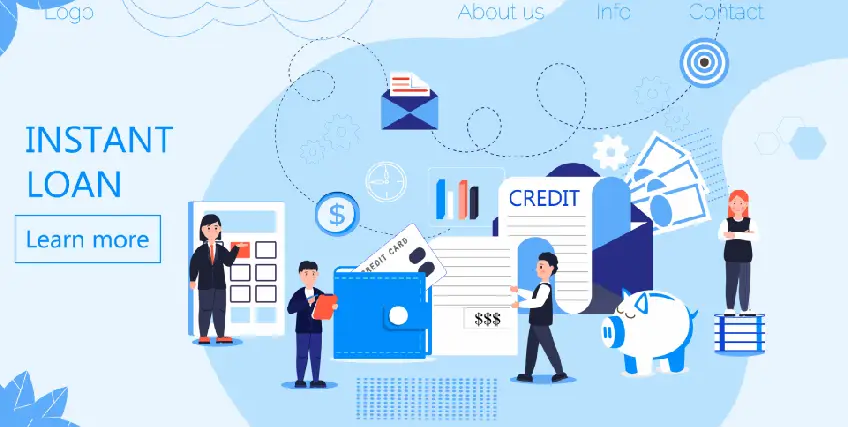Instant Business Loans for First-Time Borrowers: What You Need to Know
April 18, 2025 | Last Updated on: April 18, 2025

Securing financing is a pivotal step for small business owners aiming to launch or expand their ventures. For first-time borrowers, obtaining an instant loan can be particularly challenging due to the lack of a borrowing history. However, with the rise of online lending platforms, accessing instant loans online has become more feasible, offering fast loan approval and streamlined processes. These platforms often provide easy loans online, catering to entrepreneurs who need quick access to funds. Understanding the landscape of instant business loans is essential for new entrepreneurs to navigate the financing options available and to increase their chances of approval.
Understanding Instant Business Loans
An instant loan is a financing option designed to provide businesses with rapid access to funds, often within the same day of application approval. These small business loans are particularly beneficial for addressing urgent financial needs, such as unexpected expenses, inventory purchases, or immediate operational costs. Unlike traditional bank loans that may involve lengthy application processes and extended waiting periods, instant loans online streamline the procedure, allowing business owners to apply and receive funds swiftly. The convenience of easy loans online makes them an attractive option for entrepreneurs who require quick financial solutions without the extensive paperwork typically associated with conventional lending. It's important to note that while the approval process is expedited, lenders still assess factors such as creditworthiness, business plans, and financial projections to determine eligibility. Therefore, applicants should be prepared to provide relevant documentation and demonstrate their ability to repay the loan promptly.
Eligibility Criteria for First-Time Borrowers
For first-time borrowers seeking an instant loan, understanding and meeting the eligibility criteria is crucial. Lenders typically evaluate several key factors to assess the creditworthiness and repayment capability of applicants:
Credit Score
A strong personal credit score is a significant determinant in the loan approval process. Lenders use this score to gauge an applicant's history of managing debt and financial obligations. A higher credit score not only increases the likelihood of approval but may also secure more favorable interest rates and terms. Conversely, a lower credit score might lead to higher interest rates or even disqualification. It's advisable for potential borrowers to review their credit reports, address any inaccuracies, and take steps to improve their scores before applying.
Business Plan
A comprehensive and well-articulated business plan serves as a roadmap for the enterprise and a tool to convince lenders of its viability. This document should detail the business model, market analysis, revenue projections, operational strategies, and how the loaned funds will be utilized to achieve business objectives. A robust business plan demonstrates to lenders that the entrepreneur has a clear vision and a strategic approach to achieving success, thereby instilling confidence in their repayment ability.
Financial Statements
Even for startups without extensive financial histories, providing detailed financial projections and personal financial statements is essential. These documents offer insights into the business's expected cash flow, profitability, and overall financial health. Lenders scrutinize this information to assess whether the business will generate sufficient revenue to meet repayment obligations. Transparent and realistic financial statements can significantly enhance an applicant's credibility.
Collateral
Collateral refers to assets that a borrower offers to secure a loan, providing the lender with a form of security. In cases where the borrower's credit history is limited or less than stellar, lenders may require collateral to mitigate their risk. This could include real estate, equipment, or other valuable assets. While offering collateral can improve the chances of approval and potentially result in better loan terms, it's important to understand that defaulting on the loan could lead to the loss of these assets.
Meeting these criteria can facilitate a fast loan approval process, enabling quicker access to necessary funds.
Exploring Online Lenders
The advent of online lending platforms has revolutionized access to business financing. These platforms offer instant loans online, characterized by streamlined applications and rapid funding.
Comparing Loan Terms and Interest Rates
When considering an instant loan, it's imperative to thoroughly compare loan terms and interest rates among different lenders to ensure the financing aligns with your business's financial health and repayment capacity.
Loan Terms
Loan terms encompass various aspects, including the loan amount, repayment schedule, duration, and any associated fees. Understanding these components is vital:
- Loan Amount: Determine the exact amount needed to avoid overborrowing, which can lead to unnecessary interest payments, or under borrowing, which might leave the financial need unmet.
- Repayment Schedule: This outlines how frequently payments are due (e.g., monthly, bi-weekly) and the amount of each installment. A repayment schedule that aligns with your business's cash flow can prevent financial strain.
- Loan Duration: Short-term loans typically have higher periodic payments but may result in less interest paid over time, while long-term loans offer lower periodic payments but can accumulate more interest overall.
- Fees: Be vigilant about additional costs such as origination fees, prepayment penalties, and late payment fees, as these can significantly affect the total cost of the loan.
Carefully evaluating these terms helps in selecting a loan that complements your business's operational and financial strategies.
Interest Rates
Interest rates directly impact the total cost of borrowing and can vary widely based on several factors:
- Type of Lender: Traditional banks often offer lower interest rates compared to online lenders, reflecting the differing risk assessments and operational costs.
- Creditworthiness: A higher credit score can secure more favorable interest rates, as it indicates a lower risk to the lender.
- Loan Type: Secured loans, backed by collateral, generally have lower interest rates than unsecured loans due to the reduced risk for lenders.
- Market Conditions: Prevailing economic conditions and monetary policy can influence interest rate levels across the board.
Preparing a Strong Loan Application
A well-prepared loan application enhances the likelihood of approval for an instant loan. Key components include:
- Detailed Business Plan: Outlining the business model, market analysis, revenue projections, and operational strategies.
- Financial Documentation: Providing personal and, if available, business tax returns, bank statements, and financial projections.
- Proof of Identity and Legal Documents: Ensuring all business licenses, registrations, and personal identification documents are up to date and readily available.
By meticulously preparing these documents, borrowers can expedite the application process and demonstrate their commitment and preparedness to potential lenders.
Alternatives to Instant Business Loans
While instant loans online offer quick access to funds, they may not suit every business scenario. Alternatives include:
- SBA Loans: Backed by the U.S. Small Business Administration, these loans offer favorable terms but involve a more rigorous application process and longer approval times.
- Business Credit Cards: Useful for managing short-term expenses and building credit history, though they often come with higher interest rates.
- Crowdfunding: Leveraging platforms to raise small amounts of money from a large number of people, suitable for businesses with compelling stories or innovative products.
Exploring these options can provide additional avenues for financing, depending on the specific needs and circumstances of the business.
Conclusion
Securing an instant loan as a first-time borrower requires careful preparation, understanding of eligibility criteria, and thorough comparison of available options. Online lenders have made instant loans online more accessible, offering fast loan approval and streamlined processes. However, it's essential to assess the terms, interest rates, and suitability of these loans in the context of your business needs. By diligently preparing your application and exploring all financing avenues, you can position your business for successful funding and sustainable growth.
FAQs
Can a first-time borrower qualify for an instant loan?
Many platforms offer instant loans to first-time borrowers with good credit, verifiable income, and a solid business plan. Some lenders don’t require a long business history, especially for online loans. A registered business, business bank account, and clear funding purpose can improve your chances of fast approval.
How fast can I get funding from an instant loan?
Funding speed varies by provider, but many instant loan services offer fast loan approval, sometimes within hours, and may be able to transfer funds by the next business day. Online lenders use automated tools to speed up the underwriting process, especially when documents are complete. For instant loans online, having your business documents, financial statements, and identification ready can reduce delays. While fast, always review the loan terms before accepting to avoid high costs or unfavorable repayment terms.
Are instant loans available with bad credit?
Some lenders offer instant loans to those with bad credit, especially if other factors like strong business revenue or collateral support the application. You may qualify for easy loans online, but expect higher interest rates, shorter repayment terms, or smaller loan amounts. Improving your credit score before applying or offering security can improve your loan terms. Always compare offers and read the disclosures to avoid excessive costs.
Do instant loans require collateral?
Many instant loan providers offer unsecured loans, which don’t require collateral, especially for lower amounts. However, if your credit is weak or your business is new, some lenders may ask for assets like equipment or real estate as security. Offering collateral can help lower your interest rate or qualify for a larger loan amount. If you go with a secured loan, make sure you understand the risk of asset loss if you default.
Are there any hidden fees in instant loan agreements?
Some instant loans include fees beyond interest, such as origination fees, late payment charges, and prepayment penalties. It’s important to read the loan disclosures carefully. For fast loan approval, some platforms may skip over these in quick online signups. Before signing, make sure you understand the full cost of the loan, including APR and total amount repayable. Comparing offers from different providers will help you avoid upfront costs that catch many first-timers off guard.




